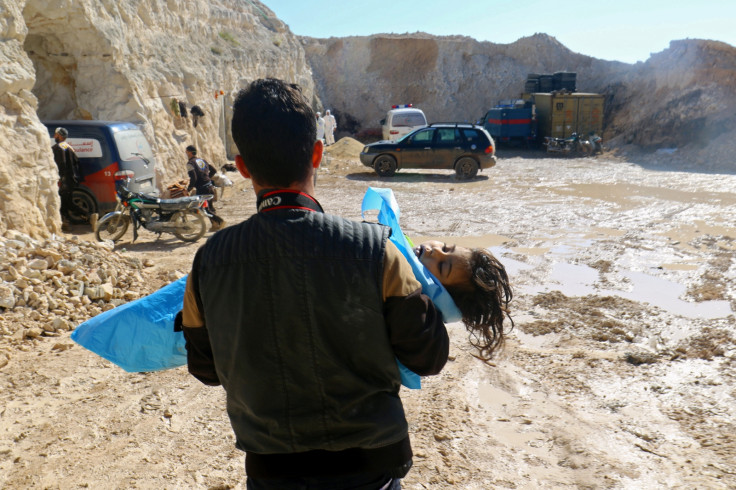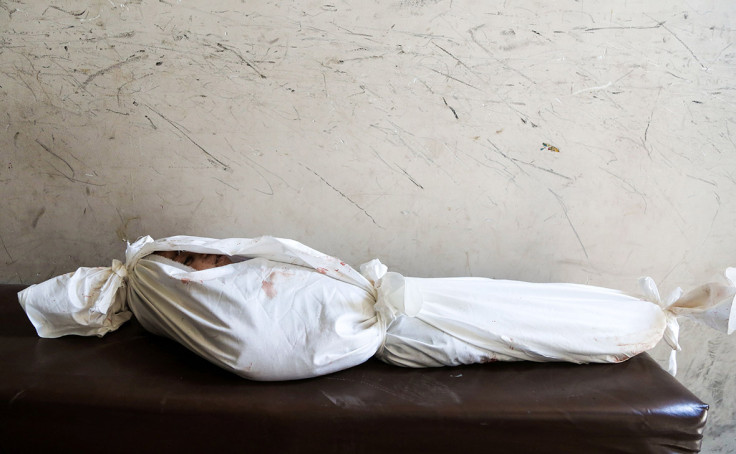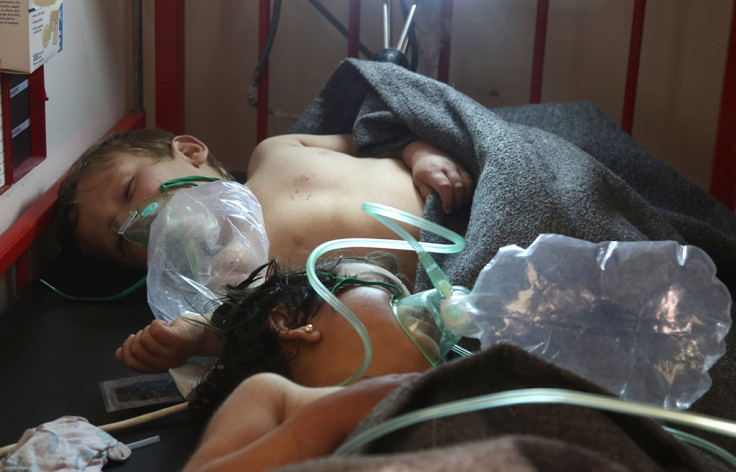Don't look away from the images of children Assad has murdered in Syria
When Britain and others decided to take no military action against Assad, he knew he could act with impunity.
In a brazen attack on humanity, Bashar al-Assad's regime allegedly launched a nerve gas attack on Khan Sheikhoun in Idlib province in Syria today. At the time of writing up to 58 people have been declared dead, according to the Syrian Observatory for Human Rights.
The distressing images coming out of northern Syria show the bodies of dead children piled on the back of pick-up trucks, their skin whitened as they died from asphyxiation. Following the attack, one of the hospitals treating patients suffering from exposure was bombed, just to make sure. This brazen attack should show the world how the Assad regime truly views its own people.
This is not the first time Assad has used nerve agents to exterminate his own people, the most well-known incident on August 23 2013 nearly brought the West to the brink of war with his regime.
Instead, a supposed compromise was reached in which Assad was allowed to escape the consequences of the chemical death he wrought upon 1,500 souls on the condition that it surrendered its entire chemical weapons stockpile to the UN OPCW for destruction. The UN OPCW won the 2013 Nobel Peace Prize for their efforts "for its extensive efforts to eliminate chemical weapons".
Syria's chemical weapons stockpiles were not fully destroyed and the Assad regime has continued to use chemical weapons against civilians.

In the lead up to the vote in British parliament over potential military action against Assad following the Ghouta attack, Kremlin-backed media outlets went on a propaganda offensive to apportion blame to anyone but the Assad regime. Open source investigations consistently showed the Assad regime were the only actor on the ground that had the capability to launch such a strike.
The Labour party, then under Ed Miliband, voted overwhelmingly against air strikes with many MPs calling for the need for 'more evidence' and citing the 'dodgy dossier' that led to the Iraq war in 2003. The government's motion was defeated and Britain and the rest of the world decided to take no military action against the Assad regime for its unspeakable crime against humanity.
I implore you all, don't turn away from what happened in Idlib today.
From that point onwards the Assad regime realised it could act with complete impunity and hasn't looked back since.
Today's brazen attack, launched on the same day as the EU's Syria conference, brings back the horrific memories of Ghouta. As with all incidents of a similar nature the media begin to pontificate on whether it is acceptable to show the reality of what has happened. Whether the images of dead children are too distressing for an audience to deal with.
As a journalist who has covered Syria for six years I implore you all, don't turn away from what happened in Idlib today. Just as the lifeless body of Alan Kurdi washed up on a Turkish shore shocked the world into paying attention to the refugee crisis, what has happened in Idlib today should do the same for Syria.

Let me explain to you the effects of nerve agents on the human body. Within a few seconds of breathing in a nerve agent like Sarin, pupils dilate and victims start to experience searing eye pain. A human exposed to Sarin will start secreting from the mouth and nose, muscles, including the heart, immediately weaken and the body's central nervous system begins to shut down.
The body begins to experience seizures and the lungs stop inhaling air. Life is literally choked out of the victim in a few truly excruciating and horrific final minutes. Sarin remains on clothing and can be passed through skin contact, meaning that first responders treating the victims of such an attack often fall victim to the agent.
Pin point pupils, one sign Sarin is the possible chemical weapon used in today's attack. Also no smell of chlorine https://t.co/7AVH6FoIUh pic.twitter.com/UTD96ruCI6
— Eliot Higgins (@EliotHiggins) April 4, 2017
There are videos filmed in Idlib today currently circulating of infants convulsing and frothing from the mouth, consistent with the symptoms of exposure to Sarin. I believe these images should be shown to the world.
For over half a decade the Assad regime has been allowed to exterminate civilians with impunity. For over half a decade the world has said "enough is enough" while turning the other cheek at each increasingly brazen war crime. It is our duty to watch the consequences of our actions unfold. We in the West get the luxury of turning away from the crimes of the Assad regime. We can proclaim that the situation is "too complex" and that "we might only make things worse" as if that excuses us shamefully allowing war crimes and crimes against humanity to continue to proliferate in Syria.
We must not turn away. If we are to decide that Syria's civilian population is beyond our help, then we must live with that decision and all its consequences. At the end of last year those consequences included watching a UN aid convoy deliberately bombed by Russian air craft. Today those consequences include dozens of dead children convulsing to death due to exposure to a toxic nerve agent deliberately and consciously released by a dictator hell-bent on killing his own population.

We in the West have decided that we will not intervene to stop this barbarity from happening, so let us truly own that decision once and for all. If the international community has permitted Assad to slaughter civilians with impunity then let us be honest about it. Let the front pages lead with the petrified faces of these innocent children, let the politicians who made these decisions be confronted with the consequences of their capitulation.
The United Nations charter was founded on the principles of "Never Again" and for six years in Syria we have consistently failed to live up to the promises we made following the end of the Second World War. Today is just another simple reminder of our shameful abandonment of the responsibility to protect.
Who knows, maybe our governments will be able to eventually forgive themselves for what we have allowed to happen in Syria. Maybe they will one day forget the ever-expanding photo gallery of murdered infants, maybe they will one day be able to fall asleep without seeing those images. Maybe they will forgive, maybe they will forget, I assure you however, that history will not.
History will not forget the faces of those children we let die in Syria, and neither should you. Their death shames us all.
Oz Katerji is a freelance journalist based in Istanbul.
© Copyright IBTimes 2024. All rights reserved.






